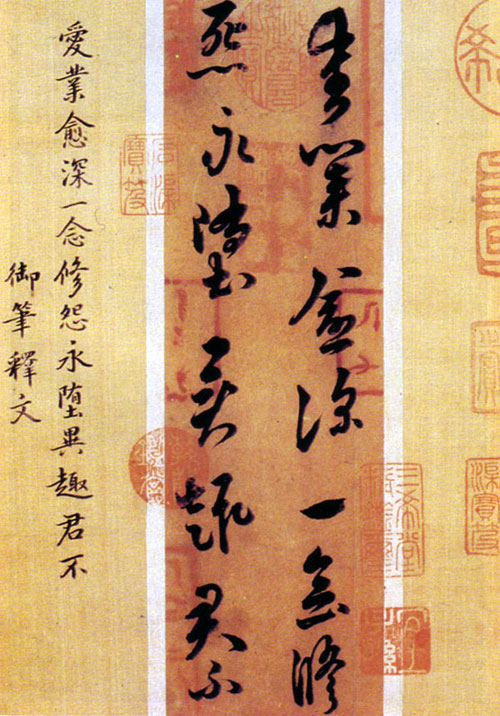Xiao Yan (464-549), Emperor Wu of Liang, was the founding emperor of Liang in the Southern Dynasties. His courtesy name was Shuda, a native of Zhongduli in Nanlanling (now Wujin County, Jiangsu Province). He was originally an official of the Qi Dynasty in the Southern Dynasty. In the last years of the Southern Qi Dynasty, he served as the governor of Yongzhou and guarded Xiangyang. He took the opportunity to build weapons, regulate ships, and wait for great changes in the world. In the second year of Qi Yongyuan (AD 500), in the name of attacking Xiao Baojuan, the Marquis of Donghun, he led his troops to attack Jiankang City and took control of the real power of the Southern Qi Dynasty. In the second year of Zhongxing of Qi (502 AD), Emperor He of Qi was forced to abdicate and officially proclaimed himself emperor. During Xiao Yan's 48-year reign, the country has developed in all aspects of politics, economy, military, and culture. He issued decrees prohibiting gifts and bribes to officials, actively advocated accepting remonstrances, and supervised officials. Pay attention to the construction of water conservancy projects, reward farming, reduce taxes and reduce labor, so that people can live and work in peace and contentment. He founded Chinese Studies, opened the Five Classics Museum, built the Confucius Temple, personally gave lectures to Tai students, and wrote more than 200 volumes such as "The Classic of Filial Piety" and "The Sixty Hexagrams of Zhouyi". The reign of Emperor Wu of Liang was the most stable and prosperous decades in the history of the Southern Dynasties.
Emperor Wu of Liang respected Confucianism and Buddhism, established Buddhism as the state religion, and built many temples. Not only did he build Buddhist temples extensively, but in order to raise money for monks in Jiankang, he sacrificed his life in Tongtai Temple three times and had his ministers redeem him for hundreds of millions of dollars. "There were four hundred and eighty temples in the Southern Dynasties, and how many towers were in the mist and rain" is a portrayal of the many Buddhist temples in Jiankang City at that time. He also organized people and held debates to attack the atheist Fan Zhen and his thoughts on the destruction of God.
In the second year of Taiqing (AD 549), the surrendered general Hou Jing rebelled and captured Jiankang Palace City. Emperor Wu of Liang was imprisoned in Jingju Hall, but he still chanted sutras constantly. In April, he died of hunger and anger.
Emperor Wu of Liang was knowledgeable and capable of both civil and military affairs. He is good at literature, good at music and calligraphy. "Liang Shu Liu Xiaochuo's Biography" calls it "elegant and good at insect seal script". Zhang Huaiguan of the Tang Dynasty said in "Shujuan": "The emperor was good at cursive calligraphy, and his appearance was also ancient. He was weak in physical strength. He had no strange posture and posture, and was inferior to Qi Gao." The achievements in the art of calligraphy are quite sophisticated. He took "almost the same as the spirit of the machine" as the standard for calligraphy criticism. He not only pioneered the work of Tang Dynasty people and Wang Xizhi, but more importantly, established an aesthetic rule that emphasizes verve for the evaluation of calligraphy, thus establishing his own position in the history of calligraphy. . He is the author of four book reviews, including "The Twelve Meanings of Guan Zhongyao's Calligraphy", "Cursive Script", "Comments on the Pros and Cons of Ancient and Modern Calligraphers", and "Book Review".
Among the handwritten notes handed down from ancient times, there is "Different Qu Tie" which is close to Zhang Cao: "The deeper your love, the more you cultivate grudges, you will fall into different places forever. Don't you..." This post was entered into the inner palace in the Qing Dynasty. As for its author, there are two theories: Xiao Yan and Wang Xian, with most leaning toward the former. Ming Dong Qichang is definitely the work of Xiao Yan.









